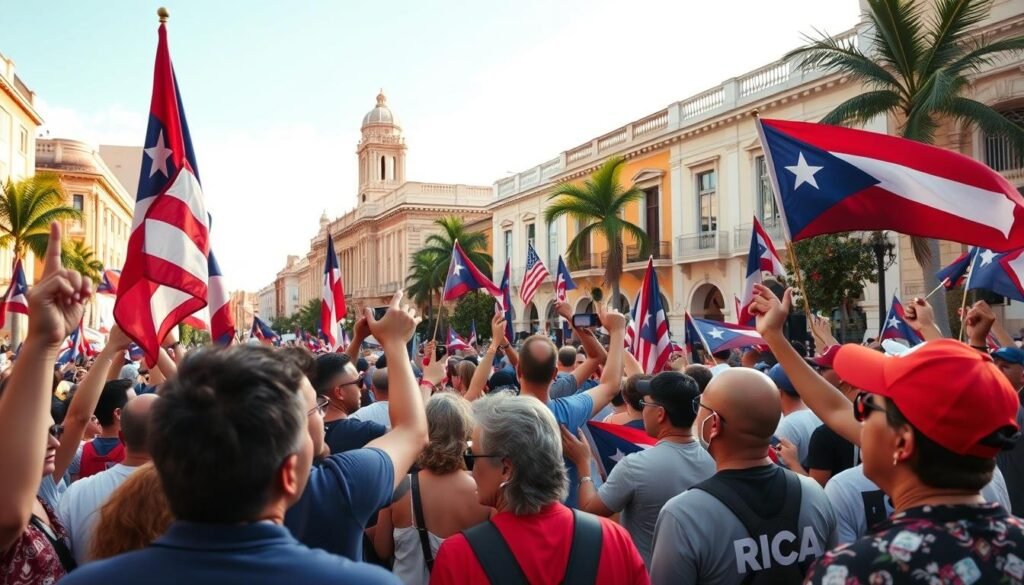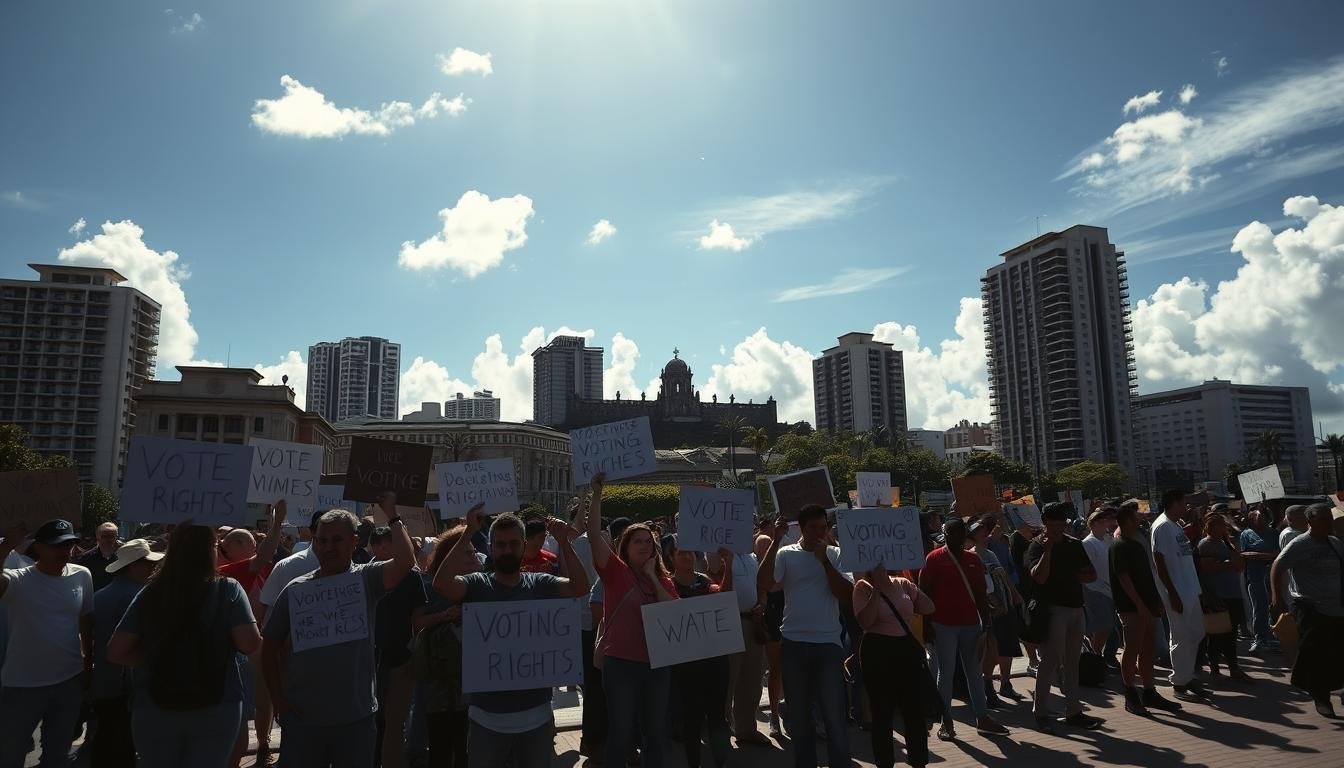Can Puerto Ricans Vote for President? As a U.S. citizen, you might wonder about voting rights in Puerto Rico. You’re likely curious if they can vote in the U.S. presidential election.
Puerto Rico’s status as a U.S. territory makes voting tricky. Even though Puerto Ricans are U.S. citizens, they face limits. They don’t have voting power in Congress or the Electoral College.
This situation sparks big questions. What does Puerto Rico’s status mean for its citizens’ right to vote? How does it impact the U.S. presidential election?
Contents
- 1 Puerto Rico’s Political Status
- 2 Can Puerto Ricans Vote for President?
- 3 The Constitutional Basis
- 4 The History of Puerto Rico-U.S. Relations
- 5 Puerto Ricans Living on the Mainland
- 6 Political Participation Options for Puerto Ricans
- 7 Pathways to Full Voting Rights
- 8 Puerto Rico Voting Rights: A Summary
- 9 FAQ: Can Puerto Ricans Vote for President?
- 9.1 Can Puerto Ricans living in Puerto Rico vote for the U.S. president?
- 9.2 Are Puerto Ricans U.S. citizens?
- 9.3 Can Puerto Ricans living on the U.S. mainland vote for president?
- 9.4 What is the current political status of Puerto Rico?
- 9.5 How do Puerto Ricans participate in the U.S. political process?
- 9.6 What are the pathways to achieving full voting rights for Puerto Ricans?
- 9.7 Have there been any efforts to change Puerto Rico’s voting rights?
Puerto Rico’s Political Status
Puerto Rico is a U.S. territory with a unique political status. This status has big effects on its people. Right now, Puerto Rico is a commonwealth. This means it’s not a U.S. state but is controlled by the U.S. Congress.
This situation limits the voting rights of Puerto Rico’s people. Even though they are U.S. citizens, they can’t vote in presidential elections unless they live in a state. This is because Puerto Rico doesn’t have any voting members in Congress, except for a non-voting delegate in the House.
The political status of Puerto Rico is a big debate. Some want it to be a state, others want it to be independent, and some want to keep it as a commonwealth. Each choice has different effects on who can vote.
It’s important to understand Puerto Rico’s political status. This helps us see the voting rights of its people and the possible futures they face. [Can Puerto Ricans Vote for President?]
Can Puerto Ricans Vote for President?
To understand if Puerto Ricans can vote for president, we need to look at their legal and historical ties to the U.S. As U.S. citizens, they have some rights. But, their voting rights in presidential elections are limited because of their territorial status.
Puerto Rico is not a state but a U.S. territory. This is key to knowing their voting rights. The U.S. Constitution lets Congress decide who can vote in territories. Right now, Puerto Rico’s residents can’t vote in presidential elections unless they live in a state.
- Puerto Ricans are U.S. citizens but lack full voting rights.
- The island’s territorial status is the main reason for this limitation.
- Residing in one of the 50 states allows Puerto Ricans to exercise their right to vote in presidential elections.
In short, even though Puerto Ricans are U.S. citizens, they can’t vote for president because of their territory status. Debates on changing this status, like becoming a state or gaining independence, are ongoing.
The Constitutional Basis
The U.S. Constitution sets the rules for Puerto Ricans in presidential elections. Article II, Section 1 says the president is chosen by electors from each state. Since Puerto Rico is not a state, it doesn’t have electoral votes.
The Insular Cases are key Supreme Court decisions. They define Puerto Rico’s relationship with the U.S. These cases show Puerto Rico is under U.S. Congress’s control. But, its residents don’t have the same rights as U.S. citizens in states.
| Constitutional Provision | Relevance to Puerto Rico |
|---|---|
| Article II, Section 1 | Electoral College system excludes Puerto Rico |
| Insular Cases | Established Puerto Rico’s territorial status and limited rights |
Puerto Rico’s voting rights are limited by its territorial status. This is based on the U.S. Constitution and court interpretations. Knowing these rules helps understand Puerto Rico’s political situation.
The History of Puerto Rico-U.S. Relations
It’s important to know the history of Puerto Rico and the U.S. to understand the island’s current situation. This includes its political status and voting rights for its people.
The bond between Puerto Rico and the U.S. started in 1898 with the Treaty of Paris. Spain gave Puerto Rico to the U.S. This was the start of a complex and changing relationship.
- The Jones-Shafroth Act of 1917 gave U.S. citizenship to Puerto Ricans. But, it didn’t give them full voting rights.
- In 1952, Puerto Rico chose to be a Commonwealth of the United States through its Constitution.
- There have been many efforts to change Puerto Rico’s status. These include trying for statehood and independence.
The history between Puerto Rico and the U.S. is complex. It involves many political, social, and economic factors. These factors still affect the situation today.
This history helps us understand why Puerto Ricans face voting rights challenges. This issue is still being discussed. [Can Puerto Ricans Vote for President?]
Puerto Ricans Living on the Mainland
If you’re a Puerto Rican living on the U.S. mainland, you might wonder about your voting rights. Your experience is different from those in Puerto Rico when it comes to voting in U.S. presidential elections.
When Puerto Ricans move to the mainland, they follow the same voting laws as other U.S. citizens. If you’re a Puerto Rican living on the mainland and a U.S. citizen, you can vote in presidential elections. You just need to register to vote in one of the 50 states.
| Residency Status | Voting Rights in U.S. Presidential Elections |
|---|---|
| Puerto Rico | No voting rights |
| Mainland U.S. (registered voter) | Full voting rights |
The table above shows the voting rights difference between Puerto Ricans in Puerto Rico and those on the mainland. Moving to the mainland and registering to vote greatly changes your voting rights in U.S. presidential elections.
Political Participation Options for Puerto Ricans
You, as a Puerto Rican, can explore different avenues for political participation. Despite the limitations on voting rights, there are various ways to engage in the political process.
One of the primary options is to participate in local elections on the island. Puerto Ricans can vote for their local representatives and officials. This influences policies that directly affect their daily lives.

For those living on the U.S. mainland, there are additional opportunities for political engagement. You can register to vote in state and federal elections. This allows you to influence national policies as a U.S. citizen.
Other Forms of Political Engagement
Beyond voting, Puerto Ricans can participate in various other political activities. These include joining advocacy groups, volunteering for political campaigns, and engaging in public debates. These activities affect the island and the broader U.S. community.
| Participation Option | Description | Eligibility |
|---|---|---|
| Local Elections | Vote for local representatives and officials | Puerto Rican residents |
| State and Federal Elections | Vote in U.S. state and federal elections | Puerto Ricans living on the U.S. mainland |
| Advocacy Groups | Join groups advocating for Puerto Rican rights | All Puerto Ricans |
By exploring these different avenues, you can make your voice heard. You can contribute to the political landscape, both locally and nationally. [Can Puerto Ricans Vote for President?]
Pathways to Full Voting Rights
If you live in Puerto Rico or care about its future, you might wonder how to get full voting rights. There are a few ways to achieve this, like changing laws or pushing for change through advocacy.
The Young v. Island Games case shows that changing the constitution is one way. Another is through the hard work of groups and people who want to see policy changes.
| Pathway | Description |
|---|---|
| Legislative Changes | Amendments to existing laws to grant voting rights |
| Advocacy Efforts | Campaigns and activism to raise awareness and push for change |
Knowing about these ways is key to helping Puerto Rico get full voting rights.
Puerto Rico Voting Rights: A Summary
You now understand the complexities of Puerto Rico’s voting rights. The island’s status as a U.S. territory limits its residents’ voting power in presidential elections. [Can Puerto Ricans Vote for President?]
Puerto Ricans living on the mainland can vote. But those on the island cannot. This difference stems from the island’s territorial status. It doesn’t get voting representation in Congress.
Looking at Puerto Rico’s history with the U.S., we see a complex path to voting rights. Ideas like statehood or independence have been suggested. Yet, no agreement has been made.
In conclusion, the fight for Puerto Rico’s voting rights is ongoing. It’s crucial to grasp the island’s political status and its effects on residents. The current situation shows the urgent need for a solution to this long-standing issue.
See Also: Can the President Fire Government Employees?
FAQ: Can Puerto Ricans Vote for President?
Can Puerto Ricans living in Puerto Rico vote for the U.S. president?
No, Puerto Ricans living in Puerto Rico can’t vote for the U.S. president. This is because Puerto Rico is not a state. It doesn’t have electoral votes.
Are Puerto Ricans U.S. citizens?
Yes, Puerto Ricans are U.S. citizens. But, their citizenship doesn’t give them the right to vote in presidential elections if they live in Puerto Rico.
Can Puerto Ricans living on the U.S. mainland vote for president?
Yes, Puerto Ricans who live on the U.S. mainland can vote for the U.S. president. They must meet the voting requirements. [Can Puerto Ricans Vote for President?]
What is the current political status of Puerto Rico?
Puerto Rico is a U.S. territory, not a state. Its residents don’t have full representation in Congress. They also can’t vote in presidential elections.
How do Puerto Ricans participate in the U.S. political process?
Puerto Ricans can participate in U.S. politics in several ways. They can vote in primary elections if they live in a U.S. state. They can also advocate for policy changes and engage in local politics.
What are the pathways to achieving full voting rights for Puerto Ricans?
There are a few ways to get full voting rights for Puerto Ricans. Puerto Rico could become a U.S. state. Or, there could be legislative changes that give electoral votes to the territory.
Have there been any efforts to change Puerto Rico’s voting rights?
Yes, there have been efforts to change Puerto Rico’s voting rights. Advocacy campaigns and proposals for statehood and electoral reform have been ongoing.

Hi, I am Tatum Bradford from Washington. I have a background in political science and work as a senior revenue officer. I love learning about U.S. presidents and sharing interesting facts about political history.

